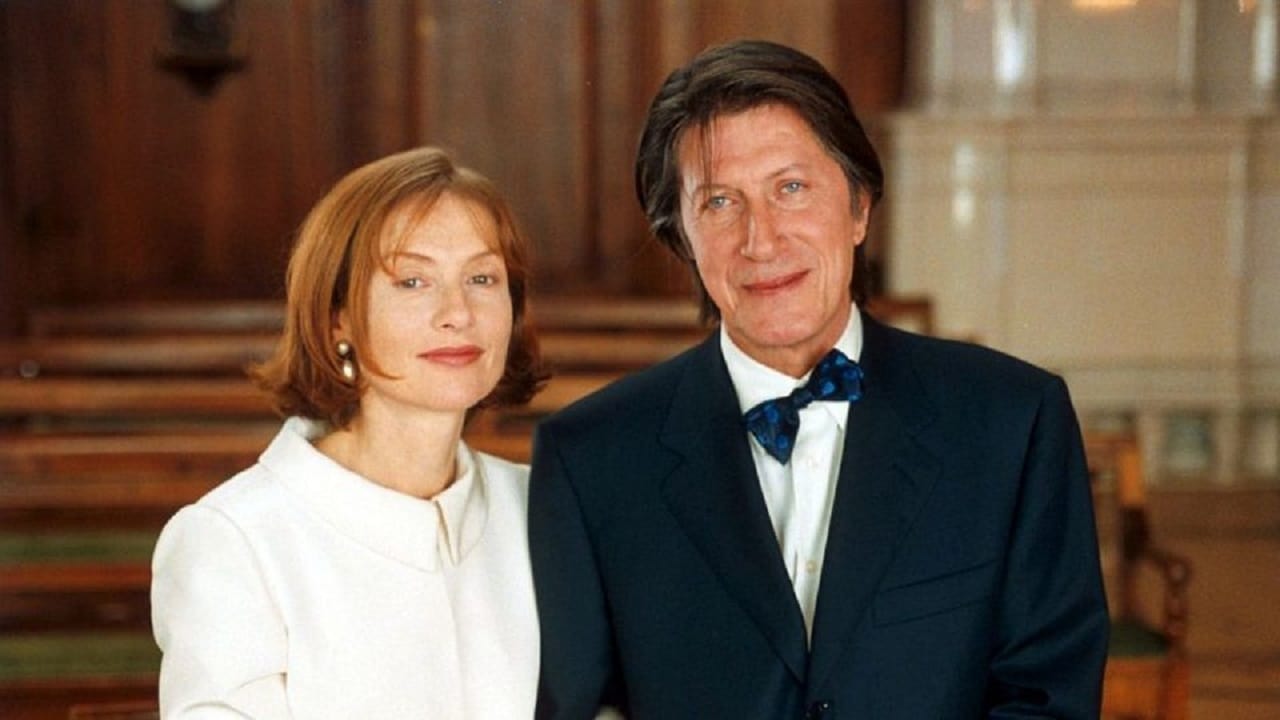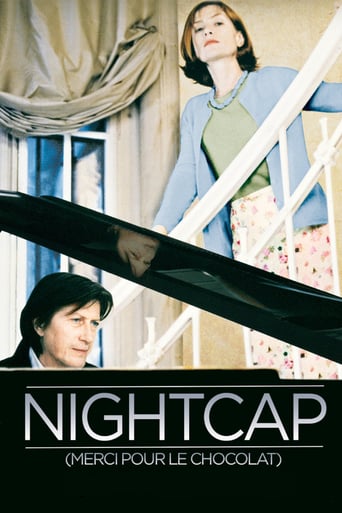



I love this movie so much
a film so unique, intoxicating and bizarre that it not only demands another viewing, but is also forgivable as a satirical comedy where the jokes eventually take the back seat.
View MoreOne of the worst ways to make a cult movie is to set out to make a cult movie.
View MoreThere's a more than satisfactory amount of boom-boom in the movie's trim running time.
View MorePart of the problem with this very interesting movie is carelessness or deliberate ambiguity on the part of director Claude Chabrol. The celebrated French master of cinema really is a bit like Alfred Hitchcock in the way he put this film together. He doesn't care so much about the consistency of detail or logic, instead what he strives for, as did Hitchcock, is effect. Begin with a tantalizing premise, build tension, and then come up with a striking ending.The premise, that of a psychologically disturbed woman of high social and economic status (Mika Muller, played with her usual haunting skill by Isabelle Huppert), whose bizarre nature forces her to poison those around her, satisfies the formula nicely. The tension is maintained by our need to find out exactly what she is doing and why and how it will affect the husband André (Jacques Dutronc), the son Guillaume (Rodolphe Pauly), and the young pianist, Jeanne Pollet (Anna Mouglalis). The ending which is heavily symbolic and deeply psychological however may disappoint some viewers. Note that as the closing credits run down the screen, Mika cries and then curls up catatonically on the couch next to a black Afghan in the shape of a spider web. She is the spider at the side of the web waiting for something to fall into it. She can't help herself. That is her nature. And that is why she cries for herself. And notice that her husband does not hate her or rage against her. Instead he seems to have pity upon her as he plays a funereal piece on the piano.Personally what disappointed me--although I still think this is an excellent film--is the way the ambiguity about Jeanne's paternity is handled. Obviously we can tell by the photos on the wall of the tragically deceased Lisbeth that Jeanne is indeed her daughter since she looks exactly like her. In fact in the next scene Jeanne unconsciously apes the pose in the photo by putting the palms of her hands to either side of her face as André watches. Another problem with the film is that nobody except the audience seems struck by the exact similarity.Additionally, the truth of her paternity is obscured by Jeanne's mother saying that the mixup at the maternity ward was straightened out to everyone's satisfaction, and besides (almost as an afterthought) she reveals that her husband was not the father, that instead she was inseminated by an unknown donor. This silliness could easily be resolved by DNA testing since the movie, which was released in 2000, is set in contemporary France. Chabrol uses a lab to establish what drug Mika is putting in the chocolate. Why not use a lab to establish paternity? Part of the reason may simply be that the novel upon which the movie is based "The Chocolate Cobweb" was written by the American mystery writer Charlotte Armstrong in the 1950's, before the age of DNA testing.The real answer however is that Chabrol didn't bother, just as he didn't bother cleaning up some other ambiguities, like why the son does not confront Mika after he is told by Jeanne that Mika is drugging him. Or why Mika deliberately spills the drugged chocolate intended for Guillaume onto the floor, allowing her to be surreptitiously observed by Jeanne through a reflection in the glass of one of the photos. The spilling seems purely a plot device to allow Jeanne a reason to get the chocolat analyzed. Furthermore, we presume that Mika, who is very rich, remarries André because she loves him or admires him or wants to be with him. And it can be seen that he would want to remarry her because of her wealth, her beauty, her elegance, etc. However, it is revealed near the end of the film that he had all along suspected her of causing Lisbeth's death since he says something like "You also washed the glasses the night Lisbeth died." He knew.One can even go to the extent of analyzing this by saying that Mika is the black widow and André finds her irresistible. Note the scene in which he suggests they make love to have a daughter and she puts him off by saying that he would be ineffective since he has already taken his Rohypnol. She says, next time before he takes his sleep potion they will do it. Furthermore notice that EVERY night he falls into a drugged sleep since he is addicted to Rohypnol. Perhaps this nightly occurrence is pleasant to Mika, in a sense an acting out of the black widow's mating ritual again and again.Nonetheless, this idea of a woman helpless against her own nature seems a bit unsatisfying. We want something more. And what she does to satisfy her urges leaves us a bit mystified. It seems hardly enough. She drugs the chocolate that she lovingly makes for Guillaume and Jeanne. Why only this? Why this at all? The logic is that she needs to excrete her poison, like a spider. The very act of doing it is what satisfies her need. The fact that somebody could take the drug and then fall asleep at the wheel of a car really is beside the point.This tale of the dark psychology within the human soul is the sort of thing that attracts Isabelle Huppert as an actress. She has played in her distinguished career a number of roles that require evil in the human soul. This is one of the more subtle ones. For one of the more striking, see her in The Piano Teacher (2001).(Note: Over 500 of my movie reviews are now available in my book "Cut to the Chaise Lounge or I Can't Believe I Swallowed the Remote!" Get it at Amazon!)
View MoreIt is a suspenseful film, never boring, kind of seductive. It's major flaw is the lack of chemistry between the Huppert-Dutronc couple. There is no way of taking this couple seriously, even as a dysfunctional pair: she is just too robotic and cruel and their communication (or lack therof) is never convincing.
View MoreThis movie is slow paced and the plot does not make much sense, but I really enjoyed watching Isabelle Huppert. She plays this all too perfect Jackie Kennedy / June Cleaver mother/wife. As you watch her performance, you witness more and more problems, each problems increasingly troubling. This apparently normal woman has serious psychological problems. The movie starts interestingly enough with Anna Mouglalis investigating the possibility that she was switched at birth and starting to investigate some odd behavior of Isabelle Huppert. But then the investigation halts for no reason and Anna Mouglalis loses her curiosity and caution and becomes a trusting naive idiot. The movie would have been less boring if the investigation had continued instead of just allowing Isabelle Huppert to reveal her problems on her own. This could have been a great movie.
View MoreThis is the second adaptation of Charlotte Armstrong by Claude Chabrol for the screen:the first was " la rupture" (1970)(from novel "the balloon man" )and it's really a pity no one cares about it.It's Chabrol's sleeper,and I urge any of his fans to see it."The chocolate" cobweb was not that strong a detective story to begin with.I read it 20 years ago and forgot all about it.The movie promises some good things at first,though,then finally disappoints to a fault.This is a confusing Chabrol movie,mixing elements of the heyday (circa 1969),and a lotta tongue-in-chick stuff coming from the eighties ,the likes of 'poulet au vinaigre",not one particularly memorable work.Part of the disappointment comes from the cast:this is a distressingly poor gathering:Jacques Dutronc plays like a zombie,Isabelle Huppert reveals herself a somewhat limited actress,finally rather vulgar .It worked in "une affaire de femme",it does not here.They are not supported by the young couple :both are bland and unremarkable.Actors from the past,say,Stephane Audran or Michel Bouquet(both in "la rupture") were brilliant and contributed to Chabrol's then unique atmosphere.The story itself is undistinguished:beginning as some kind of "serious" "la vie est un long fleuve tranquille " (besides,a character hints at Etienne Chatilliez's very funny movie),the movie drags on and on as a laughable psychological drama afterwards.We will not congratulate the young female pianist ,who,after all she learned about her wicked hostess,agrees to drive a car along a dangerous road.Because he makes too many movies,Chabrol frequently releases turkeys.One wonder why people who wants to watch one of his movies should choose this one among all his stuff up for grabs.It seems that Chabrol's bourgeoise satire has finally given way to leniency.In "la rupture" the first Armstrong adaptation-an average detective story which Chabrol completely transcended-,you should hear Audran say "they have so much money!".Here ,Chabrol has lost his bite,his strength.
View More